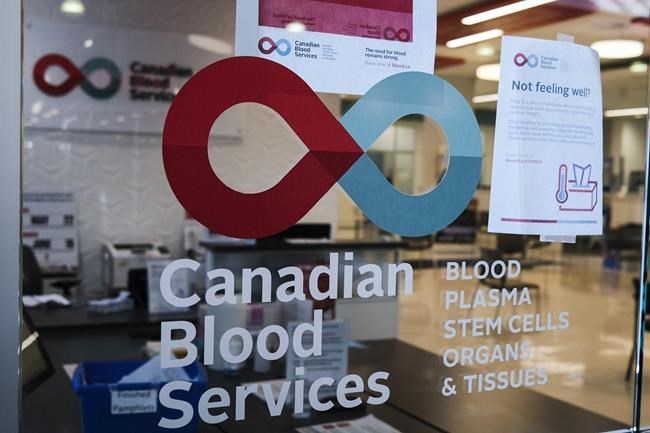
A blood donor clinic pictured at a shopping mall in Calgary, Alta., Friday, March 27, 2020. Fewer than 1 per cent of Canadian blood donors in late spring tested positive for COVID-19 antibodies, according to the results of a seroprevalence study that aimed to assess the country's infection rate of the novel coronavirus. THE CANADIAN PRESS/Jeff McIntosh
Republished September 08, 2020 - 1:19 PM
Original Publication Date September 08, 2020 - 12:11 PM
Fewer than 1 per cent of Canadian blood donors in late spring tested positive for COVID-19 antibodies, according to the results of a seroprevalence study that aimed to assess the country's infection rate of the novel coronavirus.
Canadian Blood Services and Canada's COVID-19 Immunity Task Force (CITF) released the findings of the study on Tuesday, based on 37,373 blood samples collected from blood donor centres across Canada except Quebec and the Territories from May 9 to June 18.
The results suggest that by the end of May as few as 0.7 per cent of healthy Canadians had been exposed to SARS-CoV-2, the virus causing COVID-19.
Researchers say antibodies indicate past infection, and can usually be detected within two weeks of the onset of infection.
However, they say the results of the study could underestimate "true seroprevalence" for a number of reasons.
Professor Catherine Hankins, the co-chair of CITF, says antibody levels decline rapidly, and "may have disappeared in some people by the time of testing."
Hankins also says blood donors are typically more "health-conscious and healthier" than the general population.
CITF co-chair David Naylor says the current increasing number of COVID-19 cases nationwide suggests a need for continued vigilance.
And while health experts are still unclear on how much, if any, immunity antibodies might provide, Naylor says there is "little to no likelihood" that immunity levels in the population are "high enough to slow down a second wave of COVID-19 infection.
"It's critical to ramp-up testing and tracing capacity across the country to reduce risk in settings such as workplaces and schools, and to interrupt any chains of transmission quickly to prevent spread," he added.
The results of the study were broken down by province, showing that P.E.I. and New Brunswick had the lowest seroprevalence at 0 per cent and 0.26 per cent, respectively. Ontario showed the highest with 0.96 per cent.
Quebec's Hema-Quebec ran its own study on blood donors in the province, which showed the highest seroprevalence in the country at 2.23 per cent.
In individual cities, Ottawa showed the highest percentage of SARS-CoV-2 antibodies with 1.29 per cent seroprevalence, Toronto had 1.07 per cent and Edmonton had 0.38 per cent.
Montreal and Laval showed a seroprevalence of 3.05 per cent in the Hema-Quebec study.
Dr. Graham Sher, CEO of Canadian Blood Services, says its donor base is "reasonably representative of healthy Canadians between the ages of 17 and about 60."
This report by The Canadian Press was first published Sept. 8, 2020.
News from © The Canadian Press, 2020